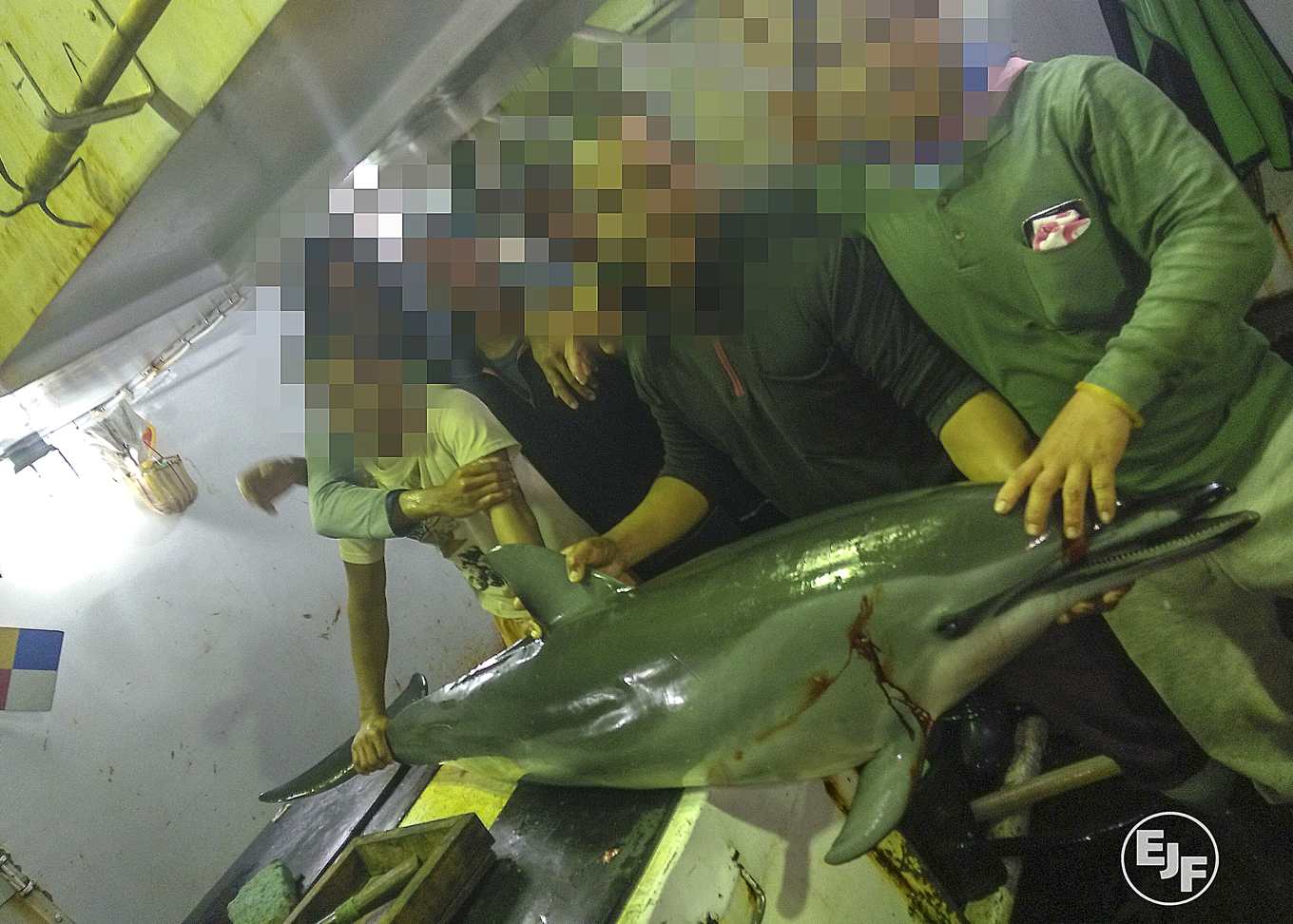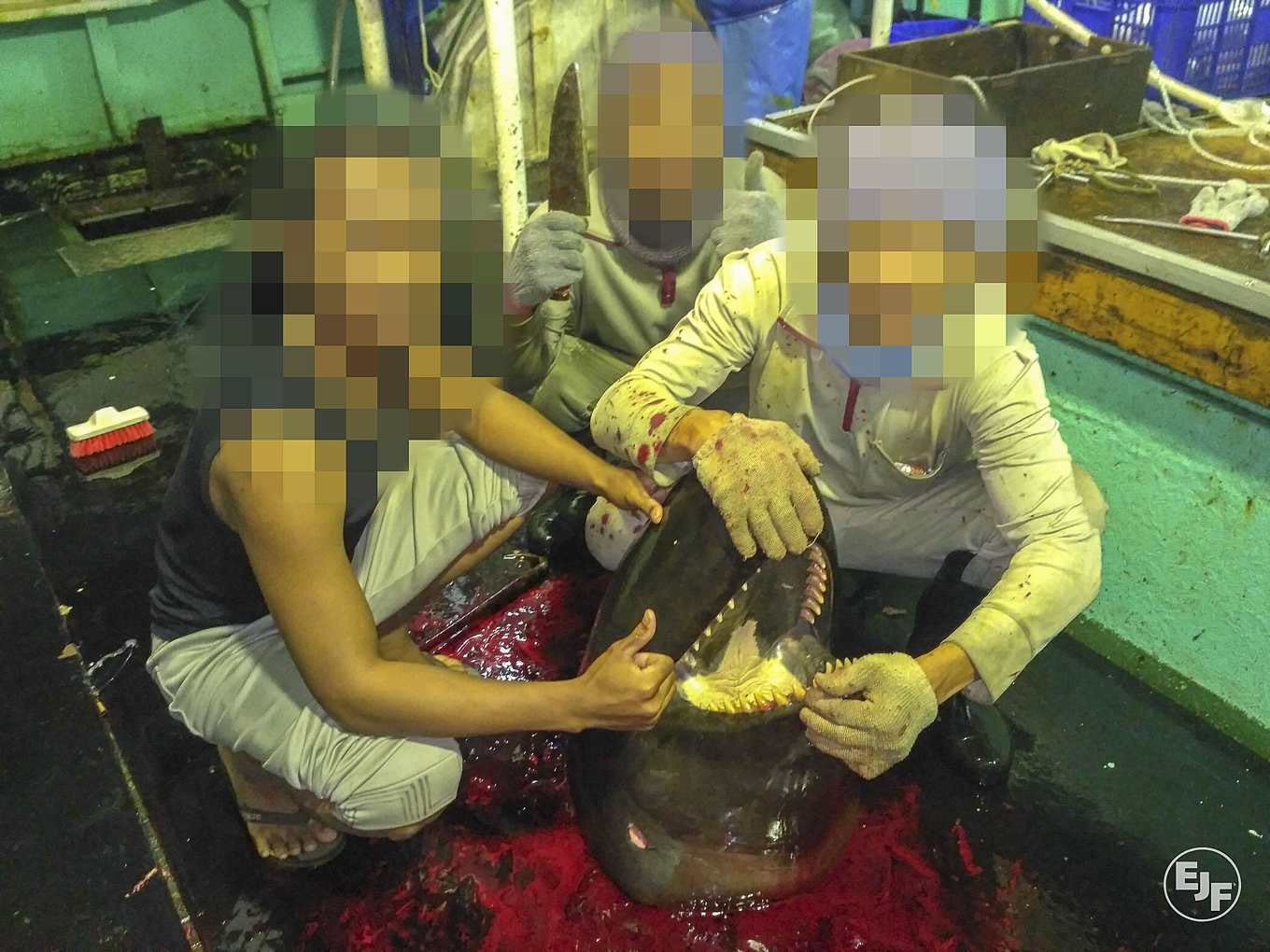EJF reveals the bloody slaughter of Taiwanese fishing boats! Kill dolphins to catch sharks, cut shark fins and abandon themselves, calling for strict management
Share1.9K + 1 Tweet EmailShares 1.9K
The Environmental Justice Foundation (Environmental Justice Foundation, EJF) released the results of a survey on illegal practices in Taiwan fishing vessels on the 5th. Last month, through interviews with seven deckhands who had invested in Taiwanese or worked on Taiwanese fishing boats in the past year, they found that the fishing boats had slaughtered conservation dolphins as shark bait, illegally finned and abandoned themselves, and caught sea turtles and other illegal fishing activities. In the face of repeated outbreaks of illegal fishing activities, Chiu Chiu-chi, director of the EJF Taiwan Ocean Project, believes that the fundamental solution is to make information transparent and install monitors and electronic sensors on fishing vessels to monitor illegal fishing activities.
Chiu Chiu-chi says that the foundation interviewed a total of seven deckhands from six fishing vessels, one of which had no problem with the situation of the deckhands, but the other five, including two expedient vessels and three Taiwanese fishing boats, found a variety of violations. As for the details of the name and owner of the ship, they were submitted to the Fisheries Department for investigation last week, and it also formally replied that the whole incident is under investigation. The Deputy Director of Fisheries, Mr Lam Kwok-ping, responded that it was still under investigation and that if it was found to be illegal, it would be handled in accordance with the relevant norms.
Five fishing boats finned and abandoned to catch dolphins as bait to catch sharks
According to the results of the interview, it was found that all five fishing boats had been finned and abandoned, and sharks without fins were thrown into the sea for fear of asphyxiation or bleeding to death, which has violated the norms of Taiwan and international regional fisheries organizations. In addition, Chiu points out that because dolphins smell so fishy that they can attract sharks, one of the fishing boats specially catches dolphins as bait to catch sharks. He can catch 100 sharks a month. "you can catch about ten a day, but you can catch two in a bad situation."
The fisherman also said in an interview with EJF, "it's easy to catch them (dolphins). We can catch about six to nine dolphins a day." If there are dolphins by the boat, even if there are already ten on deck, we will still catch them all. " The captain asked them to harpoon the dolphins near the fishing boat until they died and then pulled them on deck, and if there were any signs of life, they would be electrocuted to death.


EJF called on the Taiwan government to immediately commit to adopting the 10 recommendations put forward by "enhancing the transparency of global fisheries" and to work out a clear and feasible timetable for implementation. The ten recommendations include: each fishing vessel should have a set of identification codes, disclose fishing vessel monitoring information, publish fishing vessel permits, publish IUU lists, prohibit maritime transshipment, establish fishing vessel information systems, ban the right to use suitable vessels, publish actual beneficiary information, punish any individual involved in IUU fisheries, and adopt measures that establish clear international standards for fishing vessels and fishery products trade unless there is close monitoring. Such as the FAO Port State measures Agreement, the International Labour Organization Convention on work in the fishing Industry (ILO C188) and the International Maritime Organization Cape Town Agreement.
Among the ten recommendations, it is proposed to ban maritime transshipment unless there is close monitoring. Chiu explains that the "Global Fisheries Transparency proposal" is a recommendation to all countries in the world, and Taiwan's maritime transshipment laws and regulations stipulate that they must apply in advance. "but the problem is that if you just want illegal transshipment, you will not apply to the Fisheries Agency at all. You don't know to whom or what catch you have transferred." Therefore, we should still go back to the fishing boat to install monitors and electronic sensing equipment.
The ten recommendations include the prohibition of right-to-use vessels, as some countries open the registration of fishing vessels to all fishing vessels, which can be registered for a fee, but are not monitored or regulated to allow illegal fisheries to take advantage of. Chiu Chiu-chi points out that Taiwan is one of the few countries that require that vessels with national management rights must be registered, and the Fisheries Administration has been chasing registered expedient ship operators. "it is true that a lot of things have been done, but nearly 80% of the vessels in the world are operated by Taiwanese." Therefore, Taiwan needs to pay more attention to the issue of expedient ships.
AFD: the results of the survey will be released as soon as possible
EJF exposed illegal fishing incidents through interviews, but the specific material evidence has long been untraceable, in addition to fishermen interviews, photos, how to determine the specific illegal items? Qiu believes that it is possible to ask to compare the company's transaction records, or to confirm that it is the same fishing boat through films and photos. "and this film does show the shark's body being thrown back into the sea." This is the specific evidence.
Lin Kuo-ping, Deputy Director of Fisheries, responded that he had received relevant information in late November and had begun an investigation. Because the EJF did not specify the time and place in the information, "although there are allegations, firm evidence must be obtained." The AFD will compare the past information of the fishing vessels, ask the shipowners to explain, and so on, and will announce the investigation results as soon as possible. If it is proved to be illegal, it will be dealt with in accordance with relevant norms, including ocean regulations, fisheries law, etc.
In response to the problem of illegal reprint at sea raised by EJF, Lin Guoping explained that there are relevant norms for reprinting at sea, which must be notified in advance before transshipment, and the location, number and track of fishing vessels can be known through the fishing vessel monitoring system. Even if there is a situation of washing fish, the procedures from the origin to the market can be traced back. For example, when the fish goods are sent to the market, there will be many checks and comparisons, and there will be a return whenever there is a problem. The Agriculture and Fisheries Department will deal with it retroactively.
In response to a number of appeals made by EJF, Lin Guoping said that for some time since the ocean regulations were promulgated last year, they were also faced with protests by many fishermen last month, hoping to make law enforcement more stable under the current structure, and then see whether rolling amendments are needed in other places. The Fisheries Department also respects the transparency and further control expected by EJF and will continue to discuss with all sectors of the community and make further adjustments.
Share1.9K + 1 Tweet EmailShares 1.9K
- Prev

Grass Ridge. Fashionable men in Taiwan-young people who have been rejuvenated for many years to light up the countryside
Grass Ridge. Fashionable men in Taiwan-young people who have been rejuvenated for many years to light up the countryside
- Next

2018 "Lishan Conservation Market" is coming!
2018 "Lishan Conservation Market" is coming!
Related
- A course of planting techniques and methods on how to grow carrots
- How to plant the latest tulips?
- Is it better to pick tea in the morning or in the afternoon? When is the best time for tea to be picked? what is the third or fifth tea?
- Launch Yuanxiao Happy combination Haocha + Tea Yuan healthy Taste
- Penghu Tourism "Fireworks 20 Parade with You"
- 2022 West Lake Happiness holds "Digital Revitalization Voucher" and draws iphone13 and laptop.
- Banqiao Fuzhou social houses are designed to change start-up combined with police elimination to create a safe and livable environment
- The convenient measure of "mechanical weeding" in Xinbei has been abused and the Agriculture Bureau has imposed heavy penalties on the illegal land consolidation.
- Changgeng University Joins Hands with Four Memory Factories to Rescue Memory Talent Shortage
- The list of Taiwan's top 100 MVP managers is listed by the Director-General of the Farmers' Association of Sanxia District.

